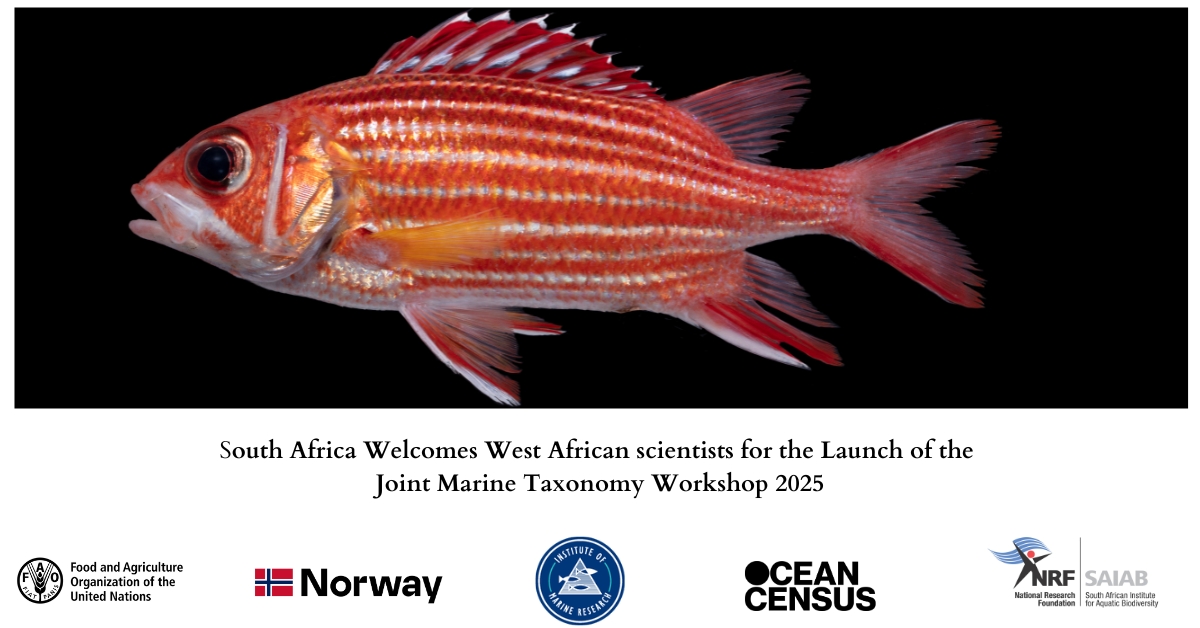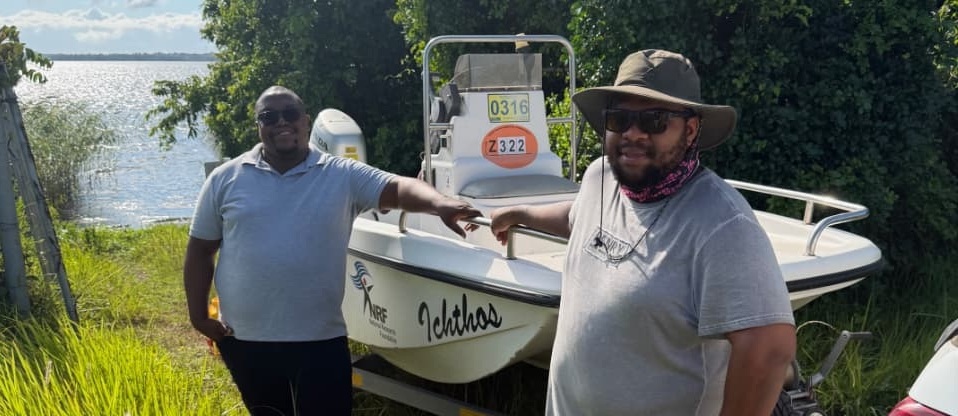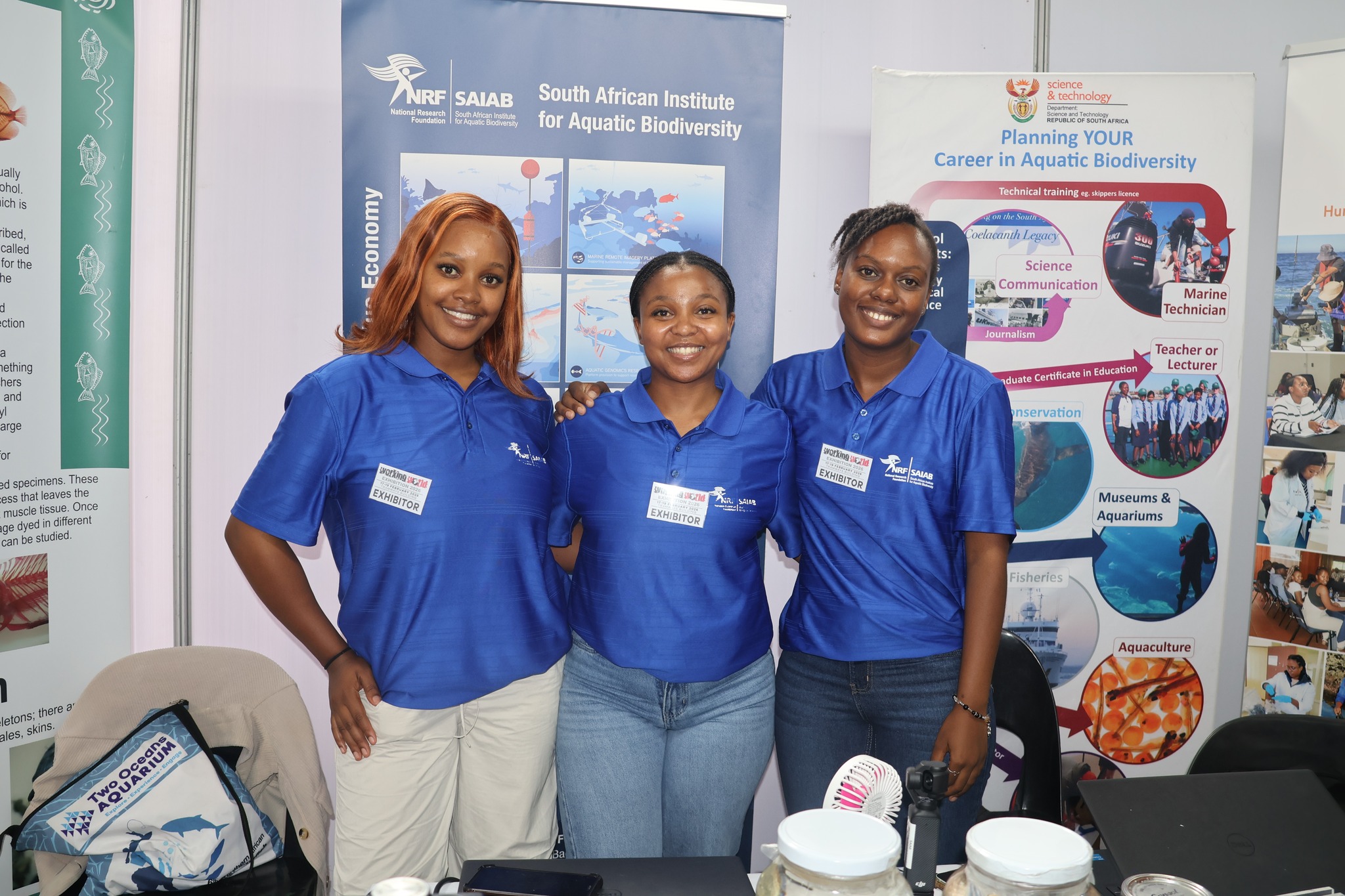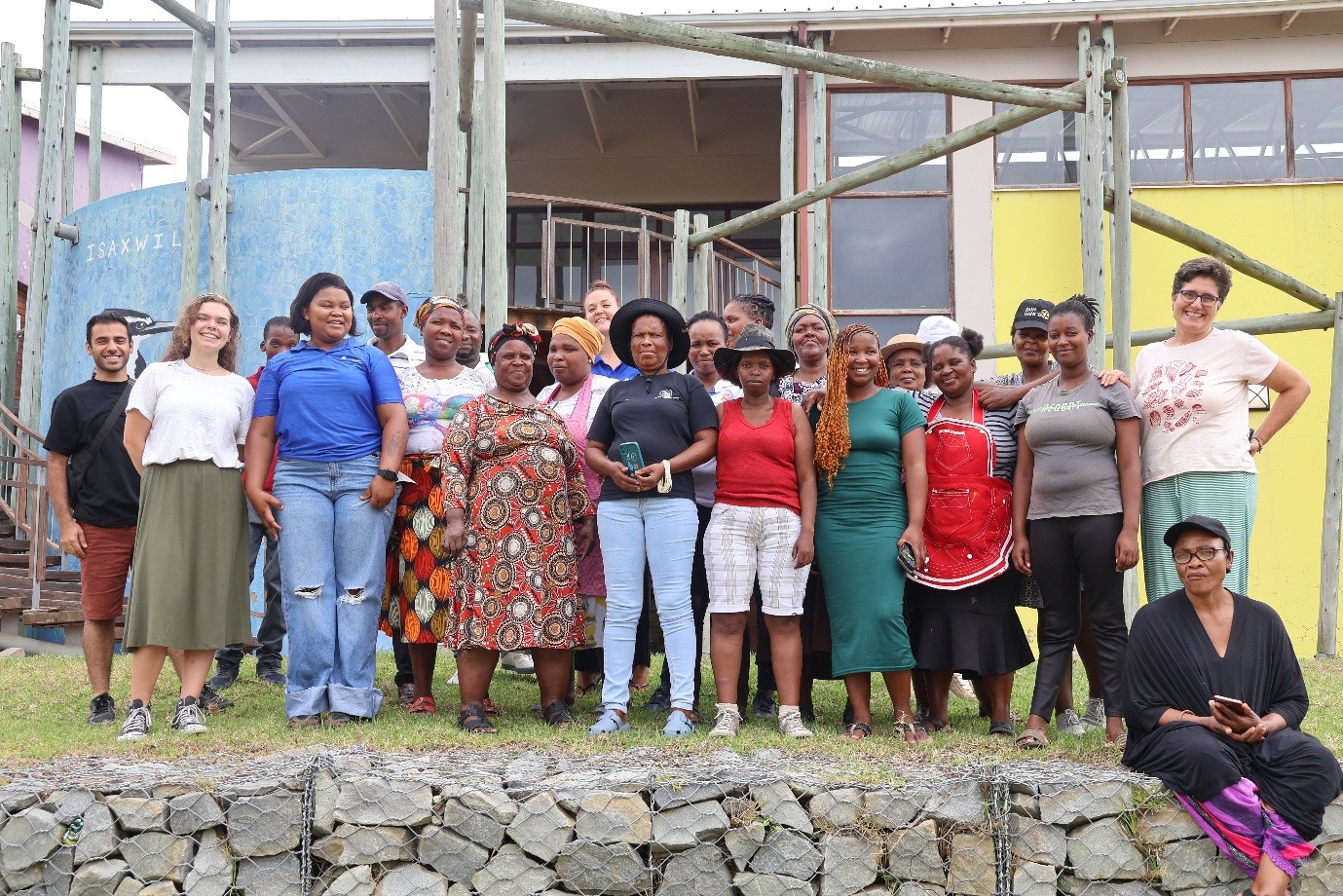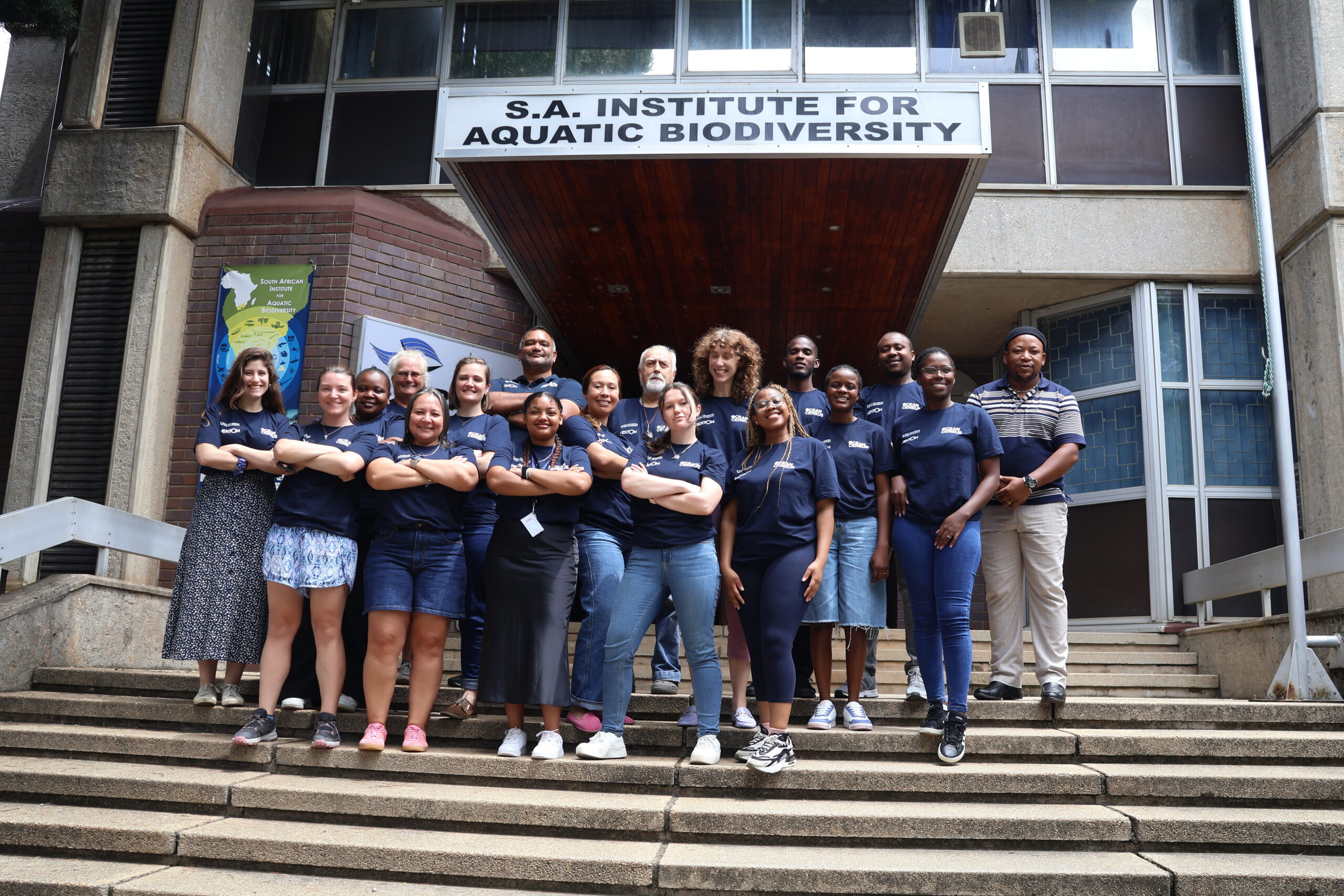Following the success of the first Post-Survey Workshop on Taxonomy Research in 2024, the EAF-Nansen Programme of the Food and Agriculture Organization of the United Nations (FAO) and Norway will once again partner with the NRF-South African Institute for Aquatic Biodiversity (NRF-SAIAB) and The Nippon Foundation-Nekton Ocean Census to host the second EAF-Nansen Programme Post-Survey Workshop on Taxonomy Research in Makhanda, South Africa from 10 to 21 November 2025.
The workshop forms part of the EAF-Nansen Programme’s ongoing commitment to strengthening capacity for marine taxonomy and biodiversity research in developing countries, in alignment with its vision to promote sustainable and ecosystem-based fisheries management.
Taking place in the lead-up to World Fisheries Day on 21 November, a series of activities and events will be held alongside the workshop to celebrate the role of scientific collaboration in promoting sustainable fisheries and ocean conservation. These events, designed for high school and university students, lecturers, and workshop participants, will take place at selected high schools, NRF-SAIAB, and Rhodes University.
Building Expertise to Bridge the Taxonomic Gap
Documenting, monitoring and conserving marine species are vital to maintaining healthy ecosystems and ensuring the sustainable use of ocean resources. However, many developing nations continue to face challenges in marine taxonomic research, reflected in the limited number of local taxonomists, lack of institutional resources, and a generational gap of expertise – collectively known as the Linnaean Shortfall.
The EAF-Nansen Programme, the longest-running fisheries development initiative of Norway and FAO, aims to address these challenges by developing local scientific capacity and promoting the Ecosystem Approach to Fisheries (EAF). The Programme’s broader goals align with international frameworks such as the UN Decade of Ocean Science for Sustainable Development (2020-2030), the Convention on Biological Diversity (CBD), and FAO’s Blue Transformation initiative.
A Collaborative Effort for Sustainable Ocean Science
The 2025 workshop will bring together a cohort of 12 West African scientists who participated in recent Nansen marine surveys along the West African coast, including the Northwest Africa, Western Gulf of Guinea, and Southwest Africa legs of the surveys conducted by the research vessel Dr. Fridtjof Nansen in 2024.
Fish and invertebrate specimens collected during these surveys will be used for training and research during the workshop. These specimens, processed at the Iziko South African Museum in Cape Town and temporarily transferred to NRF-SAIAB’s National Fish Collection for the workshop, will provide participants with relevant scientific material for hands-on experience in taxonomy research.
Participants will engage in both theory and practice, covering key methodologies such as:
- Morphometric and meristic analysis for classical taxonomy
- DNA barcoding for molecular taxonomy
- Scientific illustration and photography
- Geographical mapping (QGIS)
- Biodiversity data management and museum collection systems
Empowering the Next Generation of African Taxonomists
The Post-Survey Workshops – recently launched by the EAF-Nansen Programme – aim at elevating the capacity of local scientist to carry out taxonomic research as lead authors o and build a new generation of taxonomists in the Global South. While NRF-SAIAB provides infrastructure and in-house human power, the Ocean Census through their network of taxonomy experts contributes both technical and financial resources, enabling participants to receive training from international experts while working with real specimens collected from Nansen surveys.
“The partnership between NRF-SAIAB, the EAF-Nansen Programme and the Ocean Census represent a powerful model for equitable scientific collaboration,” says the workshop coordinator, Dr. Peter Psomadakis. “By empowering early-career scientists from Africa to lead taxonomy research, we are investing in the long-term sustainability of marine fisheries resources and biodiversity conservation.”
Expected Outcomes
Through this two-week intensive training, participants will:
- Strengthen their ability to identify and describe new species.
- Improve the quality of fisheries data reported to FAO.
- Establish a regional network of African taxonomists.
- Contribute to new species discoveries and scientific publications.
- Enhance collaboration between West African and South African taxonomists.
Ultimately, the workshop aims at empowering African researchers to actively participate in international scientific platforms, establishing them on equal footing with their international counterparts by elevating their capacity to conduct independent taxonomy research using advanced methodologies, contributing to biodiversity mapping, sustainable fisheries management, and scientific equity across the continent.
About the EAF-Nansen Programme
The EAF-Nansen Programme is a partnership between FAO, Norway, regional organizations and 32 countries across Africa and the Bay of Bengal, contributing to food and nutrition security by improving fisheries management in line with the Ecosystem Approach to Fisheries (EAF), strengthening the capacities of fisheries institutions and generating scientific knowledge on marine resources and ecosystems.
The state-of-the-art research vessel R/V Dr. Fridtjof Nansen is at the centre of the Programme, conducting marine surveys to generate scientific knowledge about marine resources and ecosystems and strengthen national capacities for ocean science.
About the NRF-South African Institute for Aquatic Biodiversity (NRF-SAIAB)
The NRF-SAIAB, a national facility of the National Research Foundation (NRF), is South Africa’s leading institute for research and expertise in aquatic biodiversity. Based in Makhanda, Eastern Cape, NRF-SAIAB plays a central role in documenting and conserving Africa’s rich aquatic life, supporting research, collections management, capacity development, and international collaboration in aquatic biodiversity science.
About the Nippon Foundation-Nekton Ocean Census
The Nippon Foundation-Nekton Ocean Census is the world’s largest alliance dedicated to accelerating the discovery of ocean life. Established by The Nippon Foundation and Nekton in 2023, the Ocean Census brings together hundreds of scientists and institutions across the globe to explore, document, and share the diversity of marine species at unprecedented speed and scale.
Contact : Peter Psomadakis Peter.Psomadakis@fao.org
Sarah VianaDe Sarah.VianaDe@fao.org
Emelie Martensson Emelie.Martensson@fao.org
